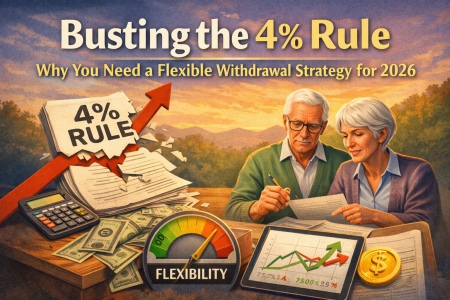The last several years of uncertainty have placed immense pressure on the economy, making markets extremely volatile and possibly affecting the long-term return of your retirement portfolio.
Conditions have been challenging enough for many Americans, as interest rates remained at historic levels, even as inflation has started to come down in recent months. Elsewhere, the cost of everyday goods and services continues to climb, and the average paycheck is now being stretched thin as more people live paycheck to paycheck.
Though there has been some improvement recently, with the Federal Reserve likely to begin cutting interest rates in the coming months and inflation trending downwards, many are anxious about the future. The stock market is volatile, and some experts still believe that the economy could be heading for a near-term recession.
With so much uncertainty, seeking out alternative investment vehicles for your retirement portfolio could become a new way to save and secure your retirement savings. Typically, one of the most important things with any portfolio is having a diversification strategy; however, having a balance between stocks, bonds, and alternative assets can be a winning recipe.
Table of Contents
ToggleAlternative Investments: What Are They & Why Invest In Them?
Many retirees look to invest in assets that can provide them with long-term financial returns and stability. These assets often include stocks or bonds. Traditionally, retirees might include a portion of cash in their portfolio by investing in a high-yield savings account or locking their capital in a long-term mutual fund.
Choosing a more traditional path may provide you with a high-liquidity portfolio, access to public markets, and the opportunity to become a passive shareholder. However, maximizing your retirement portfolio may require taking a more unconventional approach and including a healthy balance of investment vehicles that can provide additional financial leverage.
Adding alternative investments can look different from person to person, but some of the most popular alternative options that many include in their portfolio may be:
Commodities
Investing in commodities may help diversify your portfolio, as this type of asset is closely linked to raw resources used in producing goods. For example, top commodities include investments such as gold, silver, nickel, and other precious metals. Commodities may also be raw materials such as grains, including soy, wheat, barley, or basic agricultural staples.
Certificates of Deposits
Individuals can diversify their savings with Certificates of Deposits (CDs). These accounts allow you to save some of your capital at a fixed annual percentage yield (APY). These are low-risk investments, and you can decide on the length of each CD. However, historical CD interest rates show that annual percentage yields are closely linked to interest rate changes, meaning that these accounts often fluctuate over time.
Derivatives
These investments may be a higher-risk option, especially for novice investors. Derivatives are typically considered a financial contract between two or more parties. The contract derives value from an underlying asset. According to JPMorgan Chase, derivatives can help hedge your portfolio against possible risks, including assets and liabilities, while balancing your spreads.
Private Equity
Being part of a private equity investment can provide long-term financial benefits. However, there are plenty of risks associated with this investment option. For starters, private equity funds are not always available to anyone, and minimum capital requirements can start anywhere between $1 million and $5 million. Private equity has a high risk; however, you will gain exposure to private companies and underlying market segments.
Hedge Funds
Hedge funds are typically more flexible, as they pool together various investors’ capital and invest in different securities to gain a positive return. Unlike mutual funds, a hedge fund may borrow additional capital to increase investor exposure and maximize returns. While hedge funds are regulated by the Securities and Exchange Commission (SEC), these financial vehicles are not necessarily subject to particular regulatory requirements.
Real Estate or Real Estate Investment Trusts
Another way to gain exposure to the market is through real estate. Many individuals may purchase real estate to generate sustainable income, either as a rental property or a long-term asset. For those who are not comfortable with purchasing property, real estate investment trusts or REITs can provide maximum exposure to the real estate market by investing in shares of a company that owns, develops, and invests in various forms of real estate.
Venture Capital
Venture capital involves various investors or companies that pool their capital together to invest in an early-stage startup or company. Venture capital can be a smart way to gain exposure to new market segments or invest in the long-term opportunity of an up-and-coming company. Many startups today rely on venture capital during their initial early years. However, high interest rates and volatile market conditions have seen many investors pull out of venture capital activities due to low returns and speculative conditions.
Why Invest In Alternative Assets?
Similar to traditional investment vehicles, alternative investments can benefit investors and, more importantly, those looking to maximize their retirement portfolios.
Diversification
As mentioned, one of the most significant benefits of investing in these types of assets is diversifying your portfolio and gaining exposure to various capital markets and perhaps untapped market segments.
These investments can put your capital to work in many different ways, allowing you to consider various options that suit your long-term investment strategy.
For instance, your portfolio might be heavily weighted towards equities such as stocks; however, the stock market can change at any given moment, putting you at risk of losing a large percentage of your portfolio’s performance.
Having alternative investments can supplement potential losses but, more importantly, complement one another to help create a balance during volatile conditions.
Better portfolio oversight
Having a financial advisor or retirement planning professional to assist you with setting up your retirement portfolio and long-term investment strategy is an important part of planning for your golden years.
However, unlike investing in stocks and bonds, where you might not have direct control over these types of assets, you can leverage alternative investments to gain more control over your portfolio and understand where your capital is being invested.
You might find that some of your retirement accounts, such as a 401(k), are heavily exposed to the bond market. In this case, you can invest in alternative assets to gain exposure to other parts of the market that can provide you with additional financial stability.
Betting on your expertise
Many individuals draw to alternative investments because they can invest in the things they know best. Building a retirement portfolio takes time and resources, and some individuals are more comfortable investing in assets that they have experience with.
You might find that investing in real estate is a more suitable way to diversify your portfolio, given that you may have previously worked in the sector or held real estate investments.
Though it’s important to familiarize yourself with everything you include in your portfolio, investing in the things you’re most experienced with can help give you more control over your portfolio and allow you to apply a long-term strategy that considers your needs.
Uncorrelated to the stock market
Any individual who has been an active investor has lived through the heartache of seeing their portfolio dropping at seemingly dramatic rates during market downturns. Market conditions can change in an instant.
With markets more connected than ever and our economy more globalized, a sudden shift halfway around the world can impact your portfolio’s performance.
With alternative investments, you might be able to seek out assets that are not correlated to the stock market. Things such as venture capital, private equity, and CDs are not directly associated with the stock market, which can benefit you if you hold a large percentage of stocks.
While these are not without their own risks, having uncorrelated investments can help drive your portfolio in a more secure direction during a market downturn. Alternatives can protect you from volatility and the unpredictability of the stock market.
Tax incentives
Unfortunately, in retirement, you will be subject to various tax burdens. Although these taxes might be slightly lower compared to full-time income-earning individuals, you will need to ensure that you have an actionable plan in place that will allow you to maximize your account withdrawals during retirement.
Some tax incentives may apply to alternative investments, but depending on your position on each, these tax incentives may differ in each situation. Some real estate investment funds may be subject to deducted depreciation expenses. This might allow you to reduce the overall taxable income received, making these investments more profitable in the long run.
Keep in mind that pass-through depreciation and long-term capital gains treatment may still apply to alternative investments. However, depending on the structure of each asset, it’s advised to consult with an expert beforehand.
Passive Income
Unless you are investing in stocks and mutual funds that pay a monthly or quarterly dividend, you will likely not have direct access to your investments’ capital gains until you are ready to sell or cash out.
The case might be different for all types of financial vehicles. In this instance, some alternative investments can provide near- and long-term passive income. This might be more appealing for retirees, as it allows them to receive additional income as part of their retirement savings.
Some investments, such as real estate, can provide passive income, especially if you own a property debt-free and receive the monthly rent as a profit. Other investments, such as private equity and venture capital, might start delivering increased returns as the underlying business or asset begins to generate more income.
While alternative investments can provide better passive income, they are subject to taxes, and individuals may be required to declare all income as part of their taxable income.
Hedge against inflation
With each economic cycle, conditions change, and the value of assets may decrease due to rising inflation and weaker dollar purchasing power. This might not be the case for all types of investments, and some may remain the same regardless of how high or low inflation may be.
On the other hand, some investment alternatives may help retirees hedge against near-term inflation. For instance, gold, a widely traded commodity, has always been considered a good hedge against inflation.
Although gold prices are highly volatile and tend to shift throughout market cycles, investors often look towards the yellow metal for stability during market uncertainty. More than this, gold is considered a haven against conflict and geopolitical tension, market uncertainty, and recession concerns.
However, the trading power of assets seen as a hedge against inflation may often be short-lived and is widely cyclical. This would mean that some assets might outperform analysts’ forecasts, increasing their volatility.
Traditional Versus Alternative Investments
While these types of investments may share some similarities, each investor should be aware of key differences.
Liquidity
Alternative assets may have a lower liquidity level than traditional investments, which can make them harder to trade or sell. Traditional investment options are often traded on the public market, and due to their high liquidity, they can easily be sold at any time.
Liquidity can also be important for those near retirement, as these assets can help them pay off short-term debts or cover unexpected expenses. Too much liquidity can also cause additional issues for investors, and it’s important to have the right balance based on your financial needs during retirement.
Longer Commitment
Investors are generally advised to keep their assets for as long as possible, allowing them to generate sustainable levels of return. However, an investor might at any time decide to withdraw from a specific asset, either by selling their stake or returning the asset back into the market.
Alternative investments require a longer commitment period, which means that an investor might lose a percentage of their investment should they decide to sell or return it. The reason for this might be the lock-in period required to generate returns on an asset or the structure of the investment vehicle.
Level of risk exposure
Many investments are subject to some level of risk, and it’s important to consider your level of risk appetite before investing in any type of asset. One major benefit of traditional investments is that they provide investors with a certain level of stability.
Alternative investments have a higher-risk-reward approach, meaning that increased exposure to these types of investments might increase the overall level of risk of your portfolio. This can be considered a drawback for investors who are near retirement or who are sensitive to market volatility.
Asset ownership
As already mentioned, traditional investments can provide you with better control and ownership over the assets you invest in. For instance, if you invest in real estate or private equity, you may have better control over the asset and play a more active role.
Traditional investments come with less direct control. Take, for example, when investing in company stocks. You have less control over the company’s operations and decision-making, which generally influences your shares’ overall performance and return.
Having more ownership is one of the major benefits that draws investors to alternative options, however, they often require a more direct hands-on approach compared to the latter.
The Verdict
Considering the multiple benefits and drawbacks of alternative investments, there are plenty of good reasons why these assets should be included in your portfolio, especially if you’re considering investing in the long-term return of these investment vehicles.
While alternative investments are less conventional than stocks, bonds, or mutual funds, they provide investors with additional market exposure. They can help them tap into various market segments often excluded from traditional investments.
A healthy balance of traditional and alternative investments can help ensure your portfolio is cushioned against sudden market fluctuations and extreme market stress. Alternative investments may provide a level of security for those beginning to invest. But if you soon retire, this might create more risk for your near-term investment goals.
Always consider your retirement goals and financial objectives before investing in any asset. Consult with a financial advisor or talk to a professional beforehand. The more you educate yourself, the more confident you will become in your investment choices.
Featured Image Credit: Photo by Tima Miroshnichenko; Pexels













